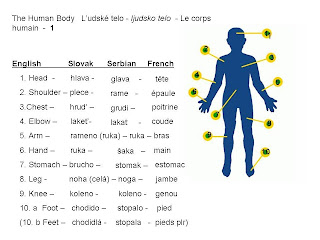After doing the exercise in Nominative, both Singular and Plural, let's move onto
Genetive case: (to find out which case is Genetive ask the following quiestons: ‘Of whom, whose’ (od koga) or ‘of what’ (čega)
Example: Some 'se' verbs require Genetive, like to be scared OF 'plašiti se' or to take hold OF 'dočepati se'
Singular: Plašim se skupog automobila.
adjectives: LEP / JAK / VISOK / VELIK / SKUP
adjectives: LEP / JAK / VISOK / VELIK / SKUP
(beautiful/strong/tall/big, large/expensive)
*Try to use all the adjectives that collocate with the nouns as follows:
Example:
Plural: ...od lepih knjiga.
(in case you are asked for your username, click 'log in as a guest')
***********************
What I don't like to do when teaching Serbian grammar is to actually give the kind of exercise I just posted above - mixing up all the genders, so you cannot infer the rule (which majority of textbooks do). That's why for more elementary students, I'd group words in an exercise like the following one:
Nominative Fem. Sg. KUĆA, DEVOJKA, TORBA, KNJIGA, ZGRADA
+ Adjective: velikA kućA, velikA devojkA, velikA torbA, velikA knjigA, velikA zgradA
(so that your ears come to like this A-A concordance)
Genetive Fem. Sg: od kućE, od devojkE, od torbE, od knjigE, od zgradE
+ Adjective: od velikE kućE, od visokE devojkE, od skupE torbE, od jeftinE knjigE
(so that your ears come to like this E-E concordance)
etc. etc.
I think that so many (meaningless) suffixes like 'a' 'e' 'ih' 'og' 'u' 'om' ... can be learnt only through drill and immersion. What do you think, how many seconds/minutes would it take for you to think about all the categories (and their corresponding suffixes) involved in the following sentence in order to utter it fluently and accurately: 'Koliko lepih devojaka u ovom divnom gradu!' ?
Genetive case: (to find out which case is Genetive ask the following quiestons: ‘Of whom, whose’ (od koga) or ‘of what’ (čega)
Example: Some 'se' verbs require Genetive, like to be scared OF 'plašiti se' or to take hold OF 'dočepati se'
Singular: Plašim se skupog automobila.
adjectives: LEP / JAK / VISOK / VELIK / SKUP
- ___________ knjigE. (book)
- ___________ momkA. (young man)
- ___________ automobilA. (car)
- ___________ nosA. (nose)
- ___________ zgradE. (building)
- ___________ kućE. (house)
- ___________ stoLA. (table)
- ___________ torbE. (bag)
- ___________ deteTA. (child)
- ___________ zrnA. (grain)
adjectives: LEP / JAK / VISOK / VELIK / SKUP
(beautiful/strong/tall/big, large/expensive)
*Try to use all the adjectives that collocate with the nouns as follows:
Example:
Plural: ...od lepih knjiga.
- ___________ momakA.
- ___________ automobilA.
- ___________ nosEVA.
- ___________ zgrada.
- ___________ kuća.
- ___________ stoLOVA.
- ___________ torbI.
- ___________ decE.
- ___________ zrnA.
- ___________ devojAkA.
(in case you are asked for your username, click 'log in as a guest')
***********************
What I don't like to do when teaching Serbian grammar is to actually give the kind of exercise I just posted above - mixing up all the genders, so you cannot infer the rule (which majority of textbooks do). That's why for more elementary students, I'd group words in an exercise like the following one:
Nominative Fem. Sg. KUĆA, DEVOJKA, TORBA, KNJIGA, ZGRADA
+ Adjective: velikA kućA, velikA devojkA, velikA torbA, velikA knjigA, velikA zgradA
(so that your ears come to like this A-A concordance)
Genetive Fem. Sg: od kućE, od devojkE, od torbE, od knjigE, od zgradE
+ Adjective: od velikE kućE, od visokE devojkE, od skupE torbE, od jeftinE knjigE
(so that your ears come to like this E-E concordance)
etc. etc.
I think that so many (meaningless) suffixes like 'a' 'e' 'ih' 'og' 'u' 'om' ... can be learnt only through drill and immersion. What do you think, how many seconds/minutes would it take for you to think about all the categories (and their corresponding suffixes) involved in the following sentence in order to utter it fluently and accurately: 'Koliko lepih devojaka u ovom divnom gradu!' ?

.png)














